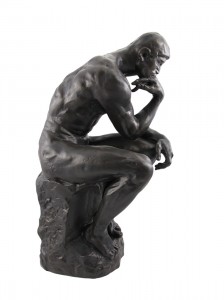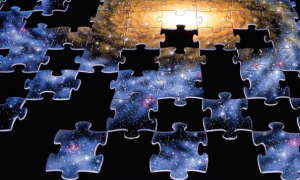“I’d take the awe of understanding over the awe of ignorance any day.” – Douglas Adams

We are all born in ignorance. Beginning with the moment of our first breath we engage in a continual struggle for knowledge and understanding of the world we live in. The infant comes equipped with a genetic template containing some rudimentary survival knowledge. The infant “knows” that his crying commands his parents love and attention, providing the scared child with the vital emotional and physical security needed to survive in a novel, unknown, and unpredictable environment. He “understands” that his suckling provides him with the nourishment he needs to survive another day. As the infant grows he masters his motor abilities and instantly sets off to discover the world around him with fervent joy, passion, commitment and a level of energy that sometimes tires even the most dedicated parent. The laws of motion are new to him but he instantly grasps the utility of understanding how they operate. As far as he is initially concerned, they could operate in an infinite number of ways. Through observation, discovery, trial and error, he gradually acquires an understanding of how they actually work, while the bumps and scrapes on his knees also prove he is learning the ways in which they don’t work. He can track the motion of a ball and comprehend that if it’s rolled under a couch it will then pop out on the other side. Specific utterances contain information and refer to certain objects, events, or activities. These utterances can be used to help him reach his goals of navigating successfully through his social environment. Of course these utterances don’t have any innate meaning until experience gives them meaning. Telling him that the top of the stove is hot means nothing to him, that is until he burns his hand on it. And what else would you expect a curious child to do other than to find out what “hot” means for himself?
It could not be any other way. If he couldn’t make these simple connections that very fact would inhibit his ability to survive and reproduce, and our species would not have evolved to our present state. All species have the basic ability to learn about the how the world around them works, but humans, with our large craniums packed with a complex, modular brain structure, billions of densely packed neurons and a highly evolved cerebral cortex, can do this much better than any other species.
“Science is a way of thinking much more than it is a body of knowledge.” – Carl Sagan
We all live in the same universe; this is the common ground that we share. The universe works the way that it works and as mortal humans we can only hope to cooperate with it. That means we need to have an accurate understanding of how it works so that we can predict the effects of our actions that we take. If we were to fall from a really high ledge, what happens next is a critical piece of information to have. If we were to tumble to our deaths, knowing that would provide us with incentives to be careful around high ledges. If angels were to catch us and safely fly us back to the ledge then we could take all the risks we want around a high ledge. The answer to the question requires accurate information about how our world works. Throughout our lives, from infancy to adulthood, we seek to discover accurate information so that we can make informed decisions about the effects of our actions. The entire goal of science is the discovery of accurate information.
Science, as Carl Sagan so succinctly stated, is not the memorization of facts or the description of phenomena, and it’s certainly not a collection of unprovable, dogmatic beliefs like religion. Science is the study of observable evidence, with the goal of drawing logical conclusions from that observable evidence, which can be used to make accurate predictions. When scientists try to discover how something works they form hypothesis, which means they come up with ideas that might be true and then they look at all of the related observable evidence to see if that evidence proves or disproves their ideas. If you think heating water molecules might cause them to rise you can conduct an experiment to heat air molecules and see what happens when you do. If the hot air rises then your hypothesis was correct. If it doesn’t rise then your hypothesis was wrong. Anyone can do perform an experiment and under similar conditions, the result will always be the same. If you have ever been on a hot air balloon ride you have done this experiment yourself without even realizing it. This basic process of observation and discovery is using science as a system of though.
The other way of studying the world begins with one deciding ahead of time that something is true, either consciously or subconsciously, and then looking around for evidence to prove they’re right. People do this all the time. They feel this is the way the world should work, or they believe things are true because their religion or philosophy tells them its true, or they have an opinion that something should work in a certain way, or whatever. But this isn’t science because you’ve determined ahead of time that something already works in a certain way, and then you systematically search for pieces of information to support your ideas while ignoring evidence to the contrary. This way of thinking can’t provide accurate information and your predictions will always be wrong. If you think hot air falls and cold air rises, you’re never going to be able to get your cold air balloon ride to work, and you probably won’t ever figure out why either until you change your system of thinking.
This world itself proves whether someones logical conclusions based on the related observable evidence is correct or faulty. By definition, someone using logic is using their partial information of a situation to figure out what the rest of the situation might be. When you use your partial information to figure out what the rest of the situation might be, it’s the situation itself that proves whether your logic was correct or not.
“Science is simply common sense at its best, that is rigidly accurate in its observation, and merciless to fallacy in logic.” – Thomas Huxley

Every child is an aspiring scientists, gradually overcoming their ignorance and replacing it with knowledge and understanding. The scientific system of thought, that basic process of observation and discovery, is the only way they know how to think. This is remarkably demonstrable when a child tries to complete a jigsaw puzzle. A jigsaw puzzle is a logic puzzle because each piece fits together in only one way. Children hold up the pieces next to each other to see if they fit together or not. That’s the logic part. Then they try to fit them together. That’s the test. If the pieces fit together their logic was correct. If they don’t fit together their logic was wrong. Period. You can’t make pieces of a jigsaw puzzle fit together by having the opinion they should fit together, or by believing they should fit together, of by feeling like they should fit together.
The universe is a giant jigsaw puzzle with science as the act of fitting the pieces together.
I’m very intrigued by your website. I would like to know more about the author(s) of the site – their credentials, education, experience and other work – so that I can feel comfortable recommending this site to my students
No comment. All I want to do is sign up for the mailing list.
Newsletter please ;]]